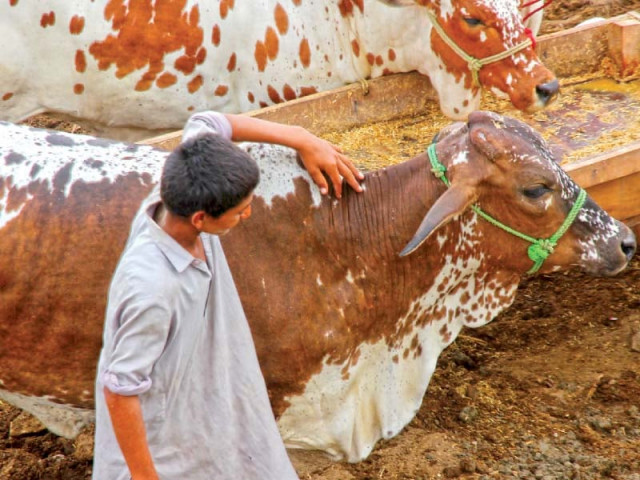Steps advised to avert threat
Experts suggest only precautionary measures can save people from the disease

PHOTO: EXPRESS
Govt sends vets to Kurram Agency after anthrax outbreak
“The threat (of Congo virus spreading) looms large as millions of animals are being brought into the city from across the country and even from neighbouring countries,” said Vice-Chancellor of the University of Veterinary and Animals Sciences (UVAS) Dr Talat Pasha.
The vice-chancellor told The Express Tribune that there were ample chances that some of these animals might be infected with Congo virus as the government has failed to screen such infected animals. “Devising a system to check millions of animals is not an easy task,” he said.
Dr Pasha said that the provincial Livestock Department had thoroughly vaccinated sacrificial animals, but nothing could be done if infected animals originated from elsewhere in the country or even neighbouring countries.
“People need to take precautionary measures such as wearing gloves and masks while slaughtering and handling animals,” he said.
Who is at Risk?
According to a research report on Congo virus compiled by Rescue 1122 Bahalwalpur DEO Dr Asif Channer, occupational groups such as herders, farmers, abattoir workers, veterinarians / animal health workers, hunters and persons informally slaughtering domestic / wild animals face greater risk of contracting Congo virus.
These people, it stated, were more exposed to ticks infesting the animals, besides handling animal blood and tissues (for example during castration of calves, vaccination, notching / tagging and slaughtering).
How people get infected?
Dr Channer said that human beings could become infected with Crimean-Congo Haemorrhagic Fever virus if bitten by infected ticks and if fluids of ticks entered cuts and grazes on skin, or splashed into eyes, nose or mouth.
Health department’s preparedness level
Last year, at least 13 deaths caused by Congo virus were reported from across the country, said the health department’s spokesman. He confirmed that the health department had set up medical camps in collaboration with the Livestock Department outside markets for sacrificial animals in Lahore.
“Although we will not set up isolation wards at general hospitals to treat Congo virus patients but I can assure that medicines to treat Congo virus patients are available in hospitals,” he said.
National strategy on Congo virus developed
“Our medics are highly-trained and know how to deal with Congo virus cases, protective gears for the safety of doctors are also available in hospitals,” he assured.
On the other hand, the spokesman said that a massive public awareness campaign had been initiated on the threat of Congo virus.
“The government is doing its best, but people must also take precautions while slaughtering animals. Precaution is the best way to avoid this deadly disease.”
Published in The Express Tribune, August 14th, 2017.



















COMMENTS
Comments are moderated and generally will be posted if they are on-topic and not abusive.
For more information, please see our Comments FAQ